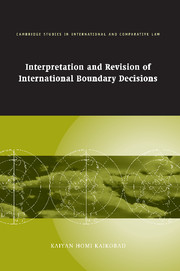Book contents
- Frontmatter
- Contents
- List of maps
- Preface
- Acknowledgments
- Table of cases
- List of abbreviations
- Part I Introduction
- Part II The settlement of territorial and boundary disputes
- Part III Judicial remedies: interpretation
- 3 The interpretation of judgments and awards
- 4 The classification of the notion of interpretation
- 5 Legal issues regarding interpretation
- 6 Principles of interpretation
- Part IV Judicial remedies: revision
- Part V Conclusions
- Select bibliography
- Index
- CAMBRIDGE STUDIES IN INTERNATIONAL AND COMPARATIVE LAW
3 - The interpretation of judgments and awards
Published online by Cambridge University Press: 14 September 2009
- Frontmatter
- Contents
- List of maps
- Preface
- Acknowledgments
- Table of cases
- List of abbreviations
- Part I Introduction
- Part II The settlement of territorial and boundary disputes
- Part III Judicial remedies: interpretation
- 3 The interpretation of judgments and awards
- 4 The classification of the notion of interpretation
- 5 Legal issues regarding interpretation
- 6 Principles of interpretation
- Part IV Judicial remedies: revision
- Part V Conclusions
- Select bibliography
- Index
- CAMBRIDGE STUDIES IN INTERNATIONAL AND COMPARATIVE LAW
Summary
Preliminary observations
The simple judicial process of interpretation arises when litigating States empower an international tribunal to provide a judgment or award clarifying, on request, jointly or severally, the meaning, scope and effect of a judgment or award previously given by the same tribunal or some other tribunal. Despite this simplicity, complex legal issues can arise when a tribunal begins to supply a clarification of what it had itself meant to hold in a previous judgment or award, or in some cases what another tribunal had said or meant to say in its decision. Before these legal issues are scrutinised, it will be appropriate to provide some perspective by looking at the evolution of this concept in international law and State practice.
Evolution of the notion of interpretation
General
In marked contrast to the remedy of revision, which is examined in Part IV below, the evolution of this principle has been uneventful. It has crept into international law on the nod, as it were, because of the inherently uncomplicated and uncontroversial nature of the basic rule. The basic rule is that, if the judgment or award is not clear on a precise issue, then the tribunal can be approached to provide an explanation or clarification on the disputed passage or passages of the decision. Of course, it is the application of the remedy in specific cases which leads to difficulties and complexities of various kinds. These issues are discussed below.
- Type
- Chapter
- Information
- Publisher: Cambridge University PressPrint publication year: 2007



